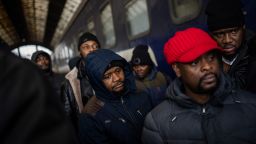As air raid sirens blared in the small Ukrainian city of Uman, about 125 miles south of the capital Kyiv, families crowded into a makeshift bomb shelter underneath a central synagogue.
Before Russia launched its invasion of Ukraine last week, the basement of the temple was used as a bathhouse for Jewish worshippers to do their ritual washing – or mivkeh – before prayers.
But now, the Synagogue of the Breslover Hasidim is opening its doors to all locals looking for shelter from the threat of Russian troops. Uman was hit by missile attacks on the first day of the invasion, but has not seen any major fighting yet. Still, the city is on edge, and remaining residents are preparing for the worst.

“We invite all the people, all Ukrainians, all Hasidic people, doesn’t matter who,” said Irina Rybnitskaya, a lawyer for the US-owned foundation that runs the synagogue. “We prepare this place especially for them, in order to hide (when) there is (an) alarm.”
The temporary hideout is lined with wooden benches and has been stocked with mattresses, blankets and hot drinks. The residents have arrived carrying their valuables and bags of clothing, in case they have to camp out for days – or longer – in the shelter.
“It’s safe to be here, that’s why I am here,” said Dasha Borscht, 16, a non-Jewish resident taking refuge in the basement.
The Jewish neighborhood in Uman is normally busy with visitors to the tomb of Rabbi Nachman of Breslov, the founder of the Breslov Hasidic movement who died in 1810. Every year in September, the streets turn into a festival scene, with tens of thousands of Jewish pilgrims descending on the memorial complex to celebrate Rosh Hashanah, the Jewish new year.
But since Uman came under attack on the first day of the Russian invasion on February 24, many residents have fled. Its shops have been left shuttered and streets strewn with litter. Roadblocks run by Ukrainian soldiers now guard the perimeter of the city, with strict document checks for every vehicle passing through.

The Jewish community in the city has dwindled from around 600 members to under less than 60 since the Russian invasion began, according to the synagogue’s lawyer.
“All the people is afraid to be here,” said Yehuda Turgiman, a worshipper at the synagogue. “Stop with the war, stop with the fighting, stop with the hate.”
Those left behind are those who can’t – or won’t – leave their homes, along with some who stay out of religious conviction.
“I didn’t go to Bulgaria, because I believe Rabbi Nachman cares about us, and nobody can do something that God doesn’t want,” said Shula, a worshipper at the synagogue who was born in Israel but has lived in Uman for 21 years. “Putin will not come here, and the soldiers will not come here.”
Other residents have decided to stay in Uman to fight back against the Russians.
Tzvi Arieli, a former soldier with the Israel Defense Forces who has lived in Ukraine for a decade, told CNN that he is helping to train civilians to use weapons and learn basic combat first aid. He said most of them are businessmen, and they have never held a weapon before.

A week ago, taking up arms was unthinkable to most people here. “We don’t have weapons, we don’t want to fight,” Turgiman said.
The threat to Uman and its holy tomb was brought into focus on Tuesday, when a Russian attack on a Kyiv TV tower struck in the vicinity of Babyn Yar shrine – a site of mourning for more than 30,000 Jew massacred there by Nazi killing squads in 1941, one of the worst mass murders of Jews during the Holocaust.
“All the community, everybody, every person, was shocked,” said Rybnitskaya. “I don’t know even how to explain the state of the (Jewish) community after this day.”
In a televised address on Wednesday, Ukraine’s President Volodymyr Zelensky, who is Jewish, said the attack was like “killing the Holocaust victims all over again,” adding that the strike demonstrates Russia’s wish “to erase our history. To erase our country. To erase all of us.” Zelensky’s own relatives were killed in the Holocaust.
Russian President Vladimir Putin has claimed without evidence that the Ukrainian government is a “gang of drug addicts and neo-Nazis” and has called for the “demilitarization and denazification of the Ukrainian state.”
But the Jewish community in Uman is adamant that Ukraine is a supportive place for them, and they reject Putin’s claims of any threat from neo-Nazis. Over the previous few years, the Rosh Hashanah new year celebrations in Uman have grown to become the biggest Jewish festival outside of Israel
“They don’t make us problem,” Turgiman said.
“It was not antisemitism, I know it because we are usually taken care of,” Rybnitskaya added.

“I have been living here for seven months. They are amazing, very loving and very caring for the Jewish people,” said Aviram Diamond from New York City.
In the makeshift bomb shelter under the synagogue, a 76-year-old ethnic Russian who went only by her first name, Iryna, sat clutching her bags on one of the benches.
She said Putin’s invasion of Ukraine is seeking to drive a wedge between religious communities – and also between Russians and Ukrainians. She was born in Ukraine, and has only spoken Russian, but she said, “Nobody ever prejudiced me here.”
“There was no difference between Russians and Ukrainians,” she said. “We were all equal. We were never enemies.”






